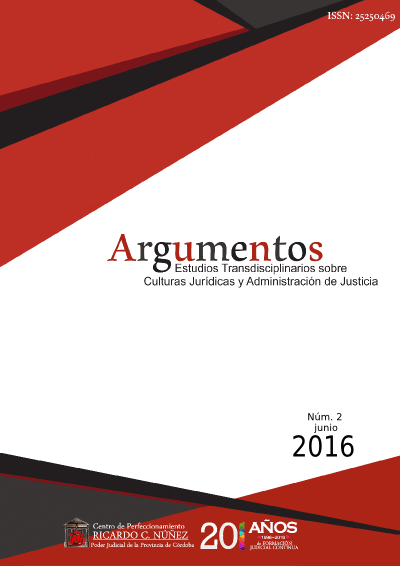Juridical alternatives to the criminal penalty
Keywords:
Criminal social inclusion, crisis, alternatives, punishment, substitutionsAbstract
The saturation of the judicial system, the benefit of avoiding all or part of the punishment for certain crimes, the prioritization of other interests on the sanction, such as recovering the victim or rejoining the author by alternative treatments, among other reasons, have led to the emergence of alternatives to the current punitive system. The aim of this research is to analyze the existing alternatives to punishment under the Argentinean and comparative law, trying to take a position on its effectiveness as a mean of substitution for the criminal punishment. The results of this research can eventually become a contribution to those people responsible of deciding whether or not to include these sanction alternatives to our current legal system. The statement: “The end of the punishment is the offender´s social inclusion” arises from the 18th article of our Constitution, the International Treaties after the 1994 reform, the embedded art. 1 of the National Law Nº 24.660 and article 1 of the Provincial Law Nº 8878. As a reaction of the “crisis to justify the punishment and failure of the criminal social inclusion attempt” alternatives for punishment come up as substitutions that pretend to improve the accomplishment of the goals.
Downloads
References
Cafferata Nores, J. I., (1998). Cuestiones actuales sobre el proceso penal. Buenos Aires: Ediciones del Puerto.
Cafferata Nores, J. I., (2001). Derecho Procesal Penal - Consensos y Nuevas Ideas.
Córdoba: Centro Estudiantes Derecho, U.N.C.
Chincilla Calderon, R. y Linares Orozco, E., (2003). Penas alternativas a la prisión. ¿menos cárcel o más control social? (Análisis del proyecto de Código Penal), Revista de la Asociación de Ciencias Penales de Costa Rica, 15(21), Octubre.
Fontán Balestra, C, (1957). Derecho penal, Introducción y Parte General. 3ª ed. Buenos Aires: Ed. Abeledo Perrot.
Fortete, C. (1999-2000). La diversión: una vía alternativa para la resolución de conflictos penales. Ley, Razón y Justicia, Revista de Investigación en Ciencias Jurídicas y Sociales, 2 (2), Neuquén.
Frascaroli, M. S. (2000). ¿Legalidad o disponibilidad de la acción penal en el derecho argentino? Cuadernos del Departamento de Derecho Penal y Criminología, 3, Córdoba: Facultad de Derecho y Ciencias Sociales, Universidad Nacional de Córdoba, Nueva Serie, Lerner.
Hulsman L. (1997). Pensar en clave abolicionista, Cuatro artículos de Louk Hulsman que desarrollan la perspectiva abolicionista. Ed. CIMAP, Traducción: Alejandra Vallespir.
Nuñez, R. C., (1981). Manual de Derecho Penal, Parte General. 3ª edición, Córdoba: Marcos Lerner.
Righi, E. (2001). Teoría de la pena. Buenos Aires: Hammurabi.
Sanz Mulas, N. (2003). Penas alternativas a la prisión. Revista de la Asociación de Ciencias Penales de Costa Rica, 15 (21), Octubre.
Silva Sánchez, J. M. (1992). Aproximación al Derecho Penal Contemporáneo. Barcelona: J.M. Bosch Editor S.A.
Soler, S. (1963). Derecho Penal Argentino. t. II, Buenos Aires: T.E.A.
Vidal, H. S., (1992). Derecho Penal Argentino, Parte General. 2ª edición ampliada y actualizada, Córdoba: Advocatus.
Vitale, G. L., (1996). Suspensión del proceso penal a prueba, Buenos Aires: Del Puerto.


